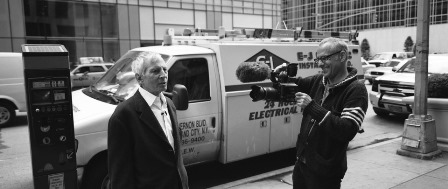The Jinx.
In the most anticipated session at this year's AIDC, Film Victoria presented Keynote in Conversation: The Jinx – Only in America.
The Saturday Paper's Martin McKenzie-Murray hosted the HBO show's producer-editor, Zac Stuart-Pontier, and its producer-cinematographer, Marc Smerling.
The Jinx tells the story of Manhattan real estate heir Robert Durst, long suspected of a hand in the disappearance of his wife Kathie in 1982.
Smerling latched on to the case via a newspaper article, and ended up writing a feature screenplay based on it.
All Good Things was made in 2010, starring Ryan Gosling as the Durst character and Kirsten Dunst as his wife.
According to Smerling, Heath Ledger was originally cast.
When Ledger died, Gosling stepped in to the breach. It was not, Smerling told the delegates, a happy partnership.
"Ryan Gosling was a huge pain in my ass", he said.
According to Smerling, Gosling was not comfortable playing a guy who killed three people, and was rewriting the script on-set.
Critics seemed to agree the film was being pulled in two different directions, but All Good Things also led to the biggest coup of the filmmakers' career.
The real Robert Durst made contact after his younger brother Doug, CEO of the family empire, threatened to sue in the lead-up to the film's release.
Durst got in touch purely to spite his much-resented brother, said Smerling, and – confoundingly – agreed to sit down with the filmmakers for a long grilling.
McKenzie-Murray asked the pair if they were ever scared.
"I was slightly scared", said Stuart-Pontier, "[but] who wants to kill the editor?" (laughs)
"I want to kill the editor", deadpanned Smerling.
Faced with the daunting task of wrangling decades of history and interview footage into a coherent story, Smerling stressed that "you have to make choices. The most important thing is to make a choice".
Stuart-Pontier also offered a diagnosis for the current fascination with true crime in contemporary culture: "When somebody commits a crime, it makes every detail of their life important", he said.
Elsewhere in the Q and A, McKenzie-Murray threw around words like "luck" and "salaciousness", neither of which Smerling looked too keen on.
A selection of deleted scenes were shown, one of which had Durst reading a diagnosis of his childhood self as schizophrenic. Why not include a detail like that?
"I hate experts in documentaries", said Smerling, who said that they didn't want to let the audience off the hook or tell them what to think.
In an audience question and answer session following the chat, the pair was asked about accusations that the audio that provides the show's twist ending (in which Durst implicates himself via lapel mic) was withheld from police.
Due to Durst's impending trial for murder, "we can't discuss [it]", Smerling said, "but I can assure you it was not a long time [between discovery of tape and handing it over]".
The duo are currently hard at work on a podcast, Crimetown.


